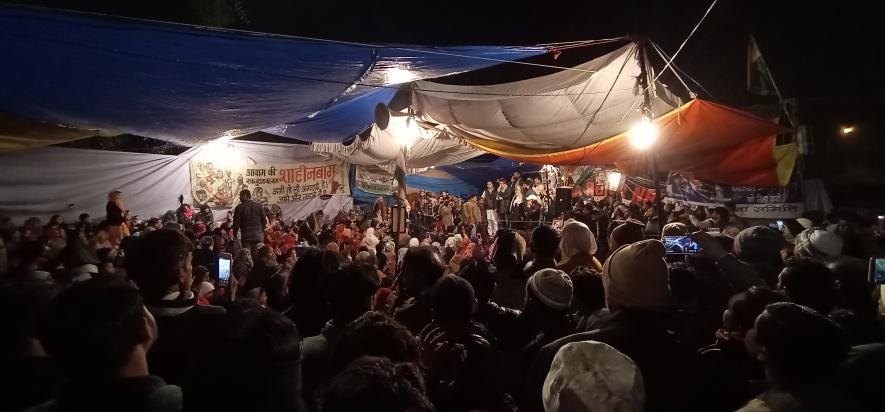Have BJP’s Fear of Protests and Poll Tactics Delayed CAA Implementation?

It is curious the Union government has failed to frame rules for implementing the Citizenship Amendment Act, 2019, even a year after the legislation came into force, on 10 January 2020, and a nationwide protest broke out against it. Opponents of the CAA would interpret the delay of one year as the Modi government’s reluctance to operationalise the law, which can only be done after rules for it are put in place, because of the fear of triggering yet another round of streets protests—and inviting international opprobrium for executing a citizenship policy perceived as discriminatory. Or the government is simply too engaged countenancing the farmer movement to risk opening yet another front against citizens.
It is difficult to determine the precise role these factors played in the delay, or whether the challenge of tackling the Covid-19 pandemic left the government with little time to frame rules. Yet it is also true that it suits the Bharatiya Janata Party government to implement its new citizenship policy after 9 July, the new deadline that the Rajya Sabha Committee on Subordinate Legislation has set for framing rules for the CAA. (The government can, obviously, frame and notify rules before 9 July or, yet again, ask for an extension.)
By June, a good month before the new deadline, Tamil Nadu, Kerala, West Bengal and Assam will have elected their new State Assemblies. All these four states witnessed anti-CAA protests of varying intensity. The Centre’s attempt to operationalise the CAA now would have turned the citizenship policy into a hot-button issue in the forthcoming Assembly elections, which are more in the nature of referendum on the performance of parties in power. Pan-India parties inject a national issue into state elections when they are sure of gaining from it. In Kerala and Tamil Nadu, the BJP is too marginal player to have even thought of squeezing the CAA for electoral advantages.
By contrast, the BJP is in power in Assam. It is making a concerted attempt to win West Bengal. Unlike in Kerala and Tamil Nadu, the CAA has an altogether a different echo in Assam and West Bengal, which have a porous border with Bangladesh, from where a large segment of its Hindu population has slipped into these two states over the decades. These migrants have been the most vocal supporters of the CAA, which debars the state from treating non-Muslim citizens of Bangladesh, Pakistan or Afghanistan who came into India before 31 December 2014, without valid travel documents, as illegal migrants. They can neither be incarcerated nor deported; their citizenship is to be fast-tracked.
Assam: Back to Muslim card
Yet their support for the CAA did not prompt the BJP to implement the new citizenship law before the Assembly elections in Assam and West Bengal—and gather their votes. One reason for this is indeed the protest of citizens. Although the agitation against the CAA in most parts of India largely drew Muslim participants, about whom the BJP does not care, the opposition to it in Assam was dominated by those who call themselves indigenous Assamese Hindus.
The origin of their resistance lay in the cut-off date used for preparing the National Register of Citizens in Assam—all those who came into the State after 25 March 1971 were to be declared as illegal migrants. The NRC, published in August 2019, excluded 1.9 million people who had submitted documents to prove their citizenship; of them, it is claimed, around 12 lakh were Bengali Hindus. In effect, the CAA, with its cut-off date of 31 December 2014, potentially grants citizenship to most of these 12 lakh Bengali Hindus.
By enacting the CAA, the BJP was perceived to have betrayed the movement of indigenous Assamese Hindus, who have been demanding, for over four decades, that illegal immigrants, or all those who came from Bangladesh into Assam after 25 March 1971, should be identified and deported, regardless of their religion. In the 2016 Assembly elections, the Assamese Hindus had overwhelmingly voted for the BJP. Stung by the CAA, they rallied under the leadership of civil right activists to protest against the CAA and brought much of Assam to a standstill in December 2019. The BJP government retaliated, most eloquently symbolised by incarcerating Akhil Gogoi, the founder of Krishak Mukti Sangram Samiti, under the Unlawful Activities (Prevention) Act.
By not framing rules for the CAA, the BJP has sought to lower the political temperature and desist from enraging Assamese Hindus into uniting on the citizenship issue. With the CAA pushed to the backburner, the BJP has the opportunity to exploit the class-caste contradictions of a hellishly socially diverse community such as the Assamese Hindus. At the same time, it seeks to paper over the divide between Assamese Hindus and Bengali Hindus by raising the Muslim bogey, palpable from the campaign statements of its influential minister, Himanta Biswa Sarma, which can be read here and here.
The delay in not implementing the CAA will unlikely annoy Bengali Hindus, who perceive the BJP to be the most ardent protector of their citizenship rights. Thus, the disadvantages of implementing the CAA far outweighs any advantage that could have accrued to the BJP in Assam.
Unsure in West Bengal
West Bengal, too, has a large number of Hindus who migrated there from Bangladesh. Among them are the Namasudras or Matuas, a subgroup of the Scheduled Castes, which account for 23 percent of the State’s population. The Matuas are 17.4 percent of the total Scheduled Caste population, and are said to influence electoral outcomes in about 50 seats. They have been keen on the CAA, precisely the reason why a large segment of them voted for the BJP in the 2019 Lok Sabha election.
The Matuas were deeply disappointed over Home Minister Amit Shah’s recent decision to cancel his public meetings in their strongholds of North 24 Parganas district. They had expected him to clarify the timeline for implementing the CAA. Days later, the news that it will take the government a few more months to frame the rules for the CAA broke out. Civil society activist Nitish Biswas, a Matua himself, said, “Matuas now know that the BJP’s CAA promise is akin to Modi’s assurance that he would give Rs 15 lakh to every person. Matuas had voted the BJP in huge numbers in the 2019 Lok Sabha election. That support will now be fragmented.”
It was presumed the BJP would deploy the CAA to go in for the kill in West Bengal, unmindful of the consequences in Assam, which has just 14 seats in the Lok Sabha. West Bengal, by contrast, has 42 seats. Winning or losing Bengal has psychological and political consequences. So, why did the BJP not implement the CAA to expand its vote-share of 40 percent, which it had bagged in 2019?
“The BJP does not want the CAA to become the central axis of the Assembly election,” explained Zaad Mahmood, who teaches political science at Presidency University, Kolkata. Mahmood said this was because a very broad segment of West Bengal’s social and ideological spectrum, which had come together to mount resistance against the CAA in 2019-2020, would have been again brought together. “More than anything else, the BJP did not want the State’s focus to shift from the corruption charges against Chief Minister Mamata Banerjee to the CAA.”
A Kolkata-based political scientist, who did not want to be named, thinks the BJP has been reluctant to play the CAA card because of its uncertainty of winning West Bengal. “It suits the BJP not to weaken the Trinamool to the point where the Left and the Congress become the alternative poles of State politics. The BJP will want to reserve its more powerful suits for the 2024 Lok Sabha election,” he said.
Confusion over documents
Another reason for the BJP going slow on framing rules for the CAA is the possibility of annoying some of those whom it hoped to provide relief. CAA rules, whenever these are formulated, will have to lay out the process of establishing whether non-Muslims who migrated from Afghanistan, Bangladesh or Pakistan did so to escape religious persecution, the stated purpose for enacting the CAA. Many illegal migrants will have a hard time proving religious persecution.
An Indian Express report, however, quoted sources saying non-Muslims will not have to prove religious persecution, as “that would be deemed to be true.” Nevertheless, it would still require applicants to furnish documents showing they came from Afghanistan, Pakistan or Bangladesh and entered India before 2015. Most illegal migrants do not possess such documents. “This is the reason why Matuas want citizenship to be granted to all community members, no question asked,” Nitish Biswas said.
It would seem the BJP went slow on framing rules for the CAA because it did not want protests to break out in the months before the Assembly elections. It will be interesting to see whether the BJP decides to meet the July deadline for framing rules. By then, the countdown to the 2022 elections in Uttar Pradesh will be about six months away.
The author is an independent journalist. The views are personal
Get the latest reports & analysis with people's perspective on Protests, movements & deep analytical videos, discussions of the current affairs in your Telegram app. Subscribe to NewsClick's Telegram channel & get Real-Time updates on stories, as they get published on our website.
























